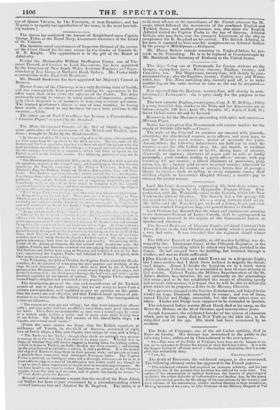The Araks Government Gazette, of the 31st of October, supplies
some particulars of the movements of the British and Turkish squa- drons ; brought to Malta by the Ilhadarnalitbus.
" By divan ieal of her M ijesty's steair.ship of war Illiadatminthus yesterday, we have news from the squadron to the :Nth instant. The late cruise of the British and Ito Iii-', squadrons toge,hur has been attended throughout with the most gratifying jilt. !changes of fiieodship; at ii It good midetstumding between the two services 11 is tlf11, 1/..1A1 cemented, which will form an epoch in the British as well as the '1 in hish annals. Tile following partieulms may not be uninteresting.
" The Ithatlamanthus, which left Malta on the 4th of October with mails for the squadron. arrived on the 6:1I at Voutla, aid found lying 111 that bay the two squadi tots, the English etittsi-ting of the P11110,1M CI:3110.te, bearing the Admiral's flag, the !kidney, 1%1'1104d. Minden, Bellerophon, Asia. ;mil Pem- broke. The Turkish siorehou consisted of live sail of the ten frigates, these brigs, three selionneis, and one curter, making together twenty-two sail of pendants. Sole of the Tt.tkish ships ate of surprising niagoit od, amid sail temarhalde well, as et i, e..41 in their cm h : in company with the English squadron hunt in to Von; ; their internal economy, as th;liring-si.ips, is not very ditt,11•Iit 111/111 th It ■.1.: out s.prolton. " Tfe 1'.1.-11., Lishl. tl ;g witi; two tails or pendants mtaelied there- to) fly Mg on boa, a Cl, c-d 'there was also a Capitan ii. e, or Vice- Admiral, and it I: ',di 1;,y, or IZem.Admir.d, with ti.o squadtua. The greatest coldialey tele, d reties n the ,:i1C(./' of the two .titiiis ; and ;lie 1;;;..i;s1,
ulli-
eers still contit neil on 1/1,11-11 the ships to superintend the telegraphic signals beta.; en tl t'e:.:e• 1•.•; " At one o'clock on the 1:11, t : Octol,T, tl, • Ill_ ;IL:31111,n the ease of Adroit:0 S'a: I:. s•:.1h.,•;(1 a:A of the (iout Pa.:I. I, :tail coaveue.1 lehlt tl,se officers ut irh ;licit resin olive suites to Sutyrisa. Thu, teas exhiliitial the sin- gular appearance of an I logli-h Admiral's 11 tg and the Turkish st ir and crescent flying from the s nue mast-lie;o:. on board 4/1112 acne ships. At about half-past tine, the wheels of the stc titer r7ete ti.et in tion ; and te, this beautiful ■essei passed through the squadron, the mat ales were di aw n up on the decks of all the ships both English and 'bark ht.:, and saluted the united flags of tie Couto a:antiers•in-Chiel, while the bands played a Turkish march : the scene teas sin. gularly interesting, both born its splendour and novelty. Oa arriving off the Castle of St. James at Smyrna, the fort saluted with twenty-one guns, the English, French, and Austrian vessels of war also paying the same compliment. The Haitian' and Talbot were lying at Smyrna, and Captain Curry of (the Bar- ham) entertained the Capitan Pacha and Admiral Sir Robert Stopfurd, with their suites, at dinner on that day. " On Wednesday, the 24th of October, the Capitan Pacha visited the :nada. menthes, for the purpose of witnessing the shell practice and working of the large l0 such 84-pounder gun. Three shells were fired by Alr. J. Howard, gunner of the Ilhatlamanthus ; and the second struck the edge of the target, and partially destroyed it ; the third passed through the bull's eye, and with singular precision exploded on the instant of contact. Capitan Paella expressed himself highly delighted and astonished at this practice."
The description given of the size end magnificence of the Turkish vessels of war is no doubt correct ; but we are sorry to learn from a private correspondent, well qualified to give an opinion on the point, that the crews arc not effective, and that Turkish naval system of pro- motion is no better than the British a century ago. Our correspondent It rites as follows- " The seamen arc vary apt and willing; but they want intermediate officers sadly ; and they never can have an efficient naval force, until great alterations are made. Their fleets are commanded as ours were a century ago, by a man of a certain rank, a:!dotti a sailor, and in many cases never having been at sea before. The Turkish fleet consists of five line-of-battle ships, te• frigates, and several small vessels." iFroin the sums source we learn, that the British squadron at anchorage off Votirla, in the Gulf of Smyrna, consisted of eight line. of.hattle ships, a fifty-gun frigate, two sloops of war, and a brig.] " The Turks are but Turks ; • theugh their chiefs are evidenely very anxious to emerge from the state they have been in for many years. Whether it is in them, or whether they will receive support in beating down the jobbing system, (which is worse in Turkey, probably, than in any other country,) and rooting up the prejudices of so extensive a nature, is still a problem. It is the system and object of Russia to keep them in their present state, and prevent as much
sa id, took offence at the surveillance of the French schooner the M. sange, which followed the movements of the combined English and Turkish fleets; and another grievance was, that when the English Admiral visited the Capitan Paella in the bay of Smyrna, Admiral Gallois, who was there, sent the youngest Lieutenant of the ship to compliment Sir R. Stupford on his arrival. The British Admiral, in his turn, is reported to have sent his compliments to Admiral Gallois by his youngest Midshipman.—Galignani.
Mr. Henry Bulwer intends returning to England before he pro- ceeds to St. Petersburg. He is to be replaced at Constantinople by Mr. Bankhead, late Secretary of Embassy to the United States.


























 Previous page
Previous page